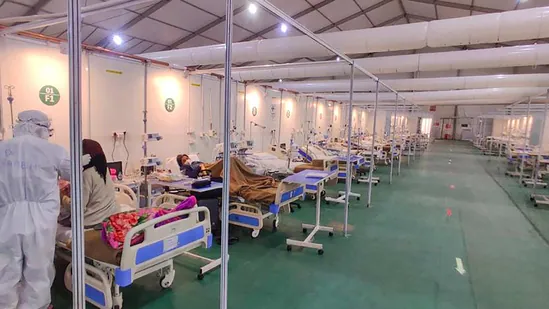Bengaluru, Jan 18: Active cases in Karnataka crossed 2.5 lakh on Tuesday as the State registered yet another spike logging 41,457 new cases of COVID-19, and 20 fatalities, taking the tally to 32,88,700 and the death toll to 38,465.
The state, which has been witnessing a steady surge in cases since the last week of December, had recorded 27,156 fresh infections on Monday, while it was 34,047 on Sunday.
Of the new cases today, 25,595 were from Bengaluru Urban that saw 4,514 people being discharged and 7 deaths.
The total number of active cases across the state is now 2,50,381.
There were 8,353 discharges, taking the total number of recoveries to 29,99,825, a health department bulletin said.
While the positivity rate for the day stood at 22.30 per cent, the case fatality rate (CFR) was 0.04 per cent.
Of the 20 deaths, 7 are from Bengaluru Urban, Mysuru (3), Tumakuru (2), and one each from Bengaluru Rural, Chamarajnagara, Chitradurga, Davangere, Dharwad, Hassan, Ramanagara and Uttara Kannada.
Apart from Bengaluru Urban, Mysuru recorded the second highest of 1,848 new cases, Hassan 1,739, Tumakuru 1,731,Bengaluru Rural 1,116, and Dakshina Kannada 1,058.
Bengaluru Urban district now has a total of 14,58,349 positive cases, followed by Mysuru 1,90,462 and Tumakuru 1,29,765.
According to the bulletin, Bengaluru Urban tops the list among discharges with 12,63,555, followed by Mysuru 1,79,623 and Tumakuru 1,20,659.
Cumulatively, a total of 5,93,91,381 samples have been tested, of which 1,85,872 were on Tuesday alone.
To view today's health bulletin: CLICK HERE
Let the Truth be known. If you read VB and like VB, please be a VB Supporter and Help us deliver the Truth to one and all.
Panaji (PTI): As part of a crackdown against tourist establishments violating laws and safety norms in the aftermath of the Arpora fire tragedy, Goa authorities on Saturday sealed a renowned club at Vagator and revoked the fire department NOC of another club.
Cafe CO2 Goa, located on a cliff overlooking the Arabian Sea at Vagator beach in North Goa, was sealed. The move came two days after Goya Club, also in Vagator, was shut down for alleged violations of rules.
Elsewhere, campaigning for local body polls, AAP leader Arvind Kejriwal said the fire incident at Birch by Romeo Lane nightclub at Arpora, which claimed 25 lives on December 6, happened because the BJP government in the state was corrupt.
An inspection of Cafe CO2 Goa by a state government-appointed team revealed that the establishment, with a seating capacity of 250, did not possess a no-objection certificate (NOC) of the Fire and Emergency Services Department. The club, which sits atop Ozrant Cliff, also did not have structural stability, the team found.
The Fire and Emergency Services on Saturday also revoked the NOC issued to Diaz Pool Club and Bar at Anjuna as the fire extinguishers installed in the establishment were found to be inadequate, said divisional fire officer Shripad Gawas.
A notice was issued to Nitin Wadhwa, the partner of the club, he said in the order.
Campaigning at Chimbel village near Panaji in support of his party's Zilla Panchayat election candidate, Aam Aadmi Party leader Kejriwal said the nightclub fire at Arpora happened because of the "corruption of the Pramod Sawant-led state government."
"Why this fire incident happened? I read in the newspapers that the nightclub had no occupancy certificate, no building licence, no excise licence, no construction licence or trade licence. The entire club was illegal but still it was going on," he said.
"How could it go on? Couldn't Pramod Sawant or anyone else see it? I was told that hafta (bribe) was being paid," the former Delhi chief minister said.
A person can not work without bribing officials in the coastal state, Kejriwal said, alleging that officers, MLAs and even ministers are accepting bribes.





